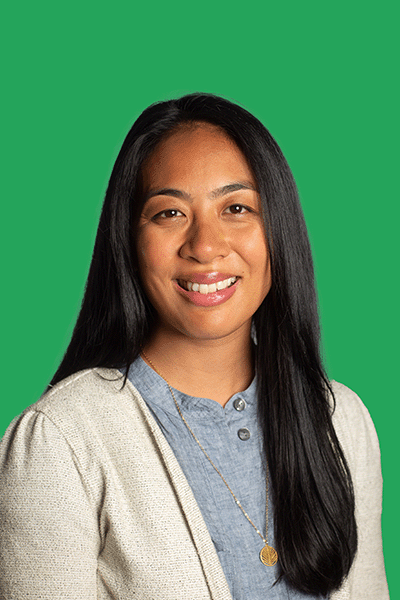Agenda – Friday, March 8, 2024
8:00 a.m.
Special Events Centers
Building 8
9:00 a.m.
Dr. Isis Artze-Vega, Provost & Vice President for Academic Affairs, Valencia College
9:10 a.m.
Dr. Paul Dosal, Senior Vice President for Student Success, University of Central Florida
9:15 a.m.

Tania Nguyen LaViolet, Ph.D.
Tania LaViolet is a director at the College Excellence Program, where she oversees the program’s Research and Innovation team. Her portfolio includes the project teams for the American Talent Initiative, Tracking Transfer and Transfer Playbook research, state-based transfer engagement pilots, program evaluation, and the research agendas for major CEP initiatives like the Aspen Prize for Community College Excellence and Unlocking Opportunity.
10:15 a.m.
Dr. Tommy Minton, Academic Dean, Seminole State College
Concurrent Session 1: 10:45 a.m. -11:30 a.m. (Select One)
Presenter: Dr. Tommy Minton, Seminole State College
Presentation Abstract
Presenters: Dr. Edie Gaythwaite, Valencia College
Gary Kokaisel, Valencia College
Presentation Abstract
Prerequisite Knowledge for Enhancing Student Success in Engineering: Preliminary Results
Presenters: Dr. Ricardo Zaurin, University of Central Florida
Dr. Sudeshna Pal, University of Central Florida
Presentation Abstract
These close knits serve as a “”Learning Community”” providing opportunities for a deeper understanding of the material being learned and closer interaction with fellow participants as well as helping them navigate all the university facilities and opportunities. This presentation describes the authors’ efforts in developing and implementing the above approach, along with some very promising preliminary results.
Presenters: Nichole Fehrenbach, Valencia College
Tom Dvorske, Valencia College
Lynta Thomas, Valencia College
Upasana Santra, Valencia College
Presentation Abstract
In this inter-institutional discussion participants will compare assessment methods. Then with results from Valencia’s assessments as examples, the session will conclude with steps to develop improvement strategies. It will become clear that faculty need opportunities to interpret learning outcomes results in their context. By looking at the learning outcome attainment of transfer populations, we can all better direct students’ pre-transfer learning and improve post-transfer success.
Presenter: Dr. Cheryl Robinson, Valencia College
Presentation Abstract
Presenters: Daniel Smith, Valencia College
Dr. Ben Lopez, Valencia College
Chauntel Copeland, Valencia College
Presentation Abstract
Using credit hour benchmarks, advising guides were created to supplement student academic experiences by guiding them through additional co-curricular activities related to their intended degree goals. To foster a strong student-advisor relationship the guides include responsibilities for the student as well as the advisor and common questions to ask an advisor.
This session focuses on the process of developing an advising guide including its origin, evolution, and successful application by students and advisors. Participants will learn how to create an advising guide and integrate it into the day-to-day student-advisor relationship.
Concurrent Session 2: 11:45 a.m. -12:30 p.m. (Select One)
Presenter: Dr. Rita Luther, Valencia College
Presentation Abstract
Chen, Xianglei. National Center for Education Statistics. (2013, November). STEM Attrition: College Students’ Paths Into and Out of STEM Fields. A Statistical Analysis Report. http://nces.ed.gov/
Presenters: Lori Dunlop-Pyle, University of Central Florida
Dr. Sidra Van De Car, Valencia College
Joanne Kiriazes, Valencia College
Dr. Maria Capursi, University of Central Florida
Presentation Abstract
Presenters: Diana Pienaar, Valencia College
Ashton Terry, The School District of Osceola County
Michael Holt, Midtown Consulting – CFEED Technical Partner
Presentation Abstract
CFEED is excited to share our most recent work demonstrating student specific readiness at different points in their academic journey. CFEED has been a driver of change within the college to university transfer landscape.
Specifically, we have been deeply involved in the Helios Transfer Scholars Grant which was designed to support transfer students to UCF with incentives to ensure courses relevant to their major are taken prior to transfer. CFEED will demonstrate the ways we use our Interactive Transfer Readiness model which incorporates our analytics connecting Relevant Courses for UCF majors to determine the likelihood of student success.
Additionally, our team has helped establish programs like the Osceola Prosper program to increase student enrollment at the college level. CFEED will demonstrate our ability to connect the emerging trends of student movement and readiness from Osceola Prosper to future transfer success.
Presenter: Dr. Marino Nader, University of Central Florida
Students were given survey questionnaires that indicated most students liked the MAT and would like to see it in other courses as well.
Presenters: Nichole Fehrenbach, Valencia College
Darren Smith, Valencia College
Anthony Dixon, Valencia College
Veeramuthu Rajaravivarma, Valencia College
Presentation Abstract
Presenters:
Deborah Lynch, Seminole State CollegeCarlee Walkover, Seminole State College
Amanda Taylor, Seminole State College
Presentation Abstract
Our institutions partner together through events such as Fall and Spring Curriculum Alignment meetings, utilization of Navigate to create academic plans that include common program prerequisites for UCF majors, and on campus partnered activities. Come learn about our creative methodologies used to engage with our students and ensure they are transfer and major ready.
Our students Go State, Go Far, and Charge On!!
12:45 p.m.
Special Events Centers
Building 8
1:30 p.m.
Moderators:
Dr. Quynh Dao Dang, Director of Experiential Learning, University of Central Florida & Dr. Natalia Leal Toro, Director of the Office of Undergraduate Research, University of Central Florida
Panelists:
- Isabella Loor, Biomedical Sciences , Seminole State College
- Robin Pitilon, Biology, Valencia College
- Nathalia Cordero Rodriguez, Biomedical Sciences, Valencia College
- Leah Basaria, Clinical Psychology, Valencia College
- Tiffanie Crumbie, Engineering, Valencia College
2:30 p.m.
Dr. Kim Hardy, Assistant Vice Provost, University of Central Florida
Dr. Wendy Givoglu, Provost, Downtown & Winter Park Campuses & Transfer Initiatives, Valencia College
3:30 p.m.
Dr. Erik D’Aquino, Vice President of Enrollment Management, Daytona State College
If you have any questions or need further information, please don’t hesitate to contact us via email at tsspconference@ucf.edu.
